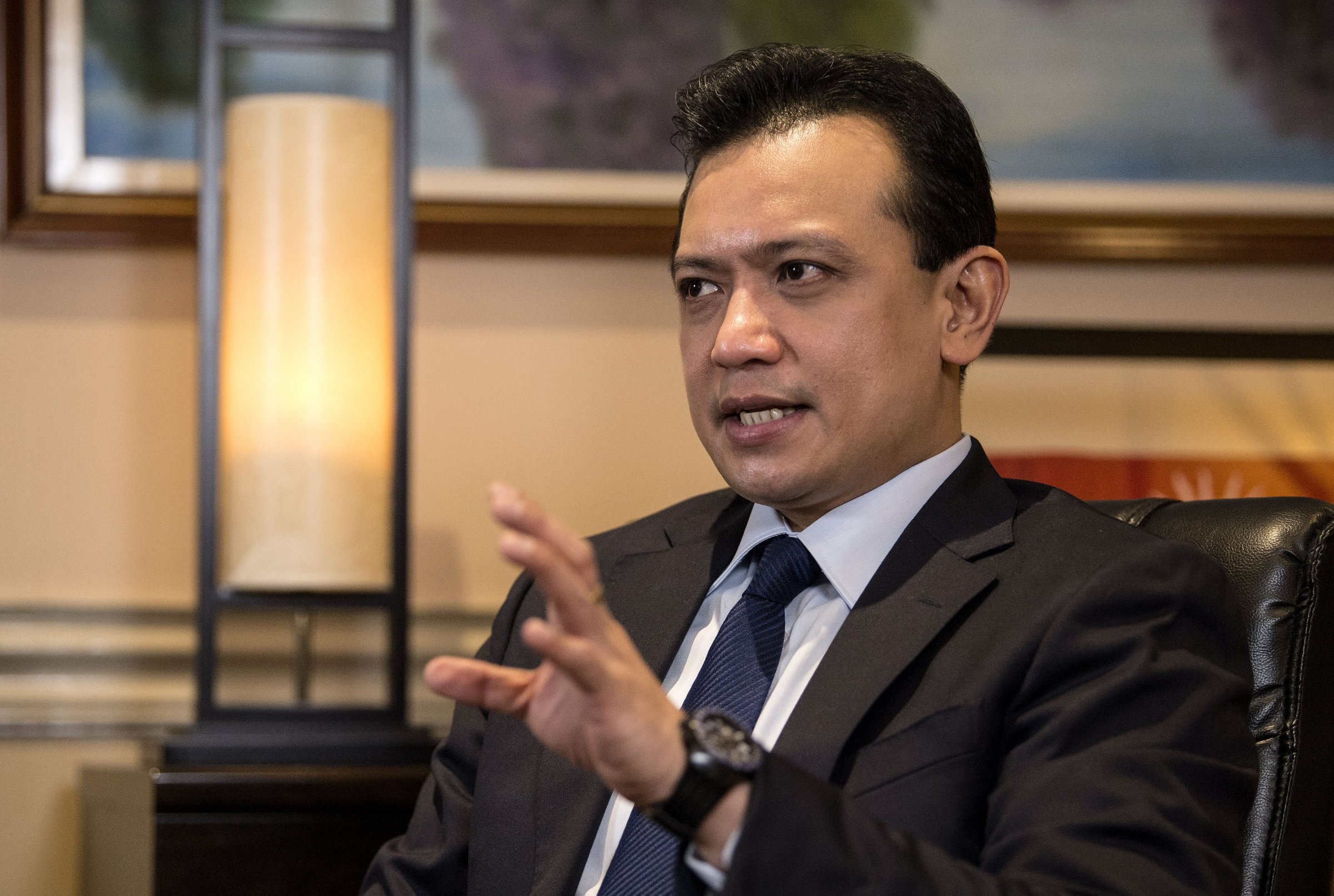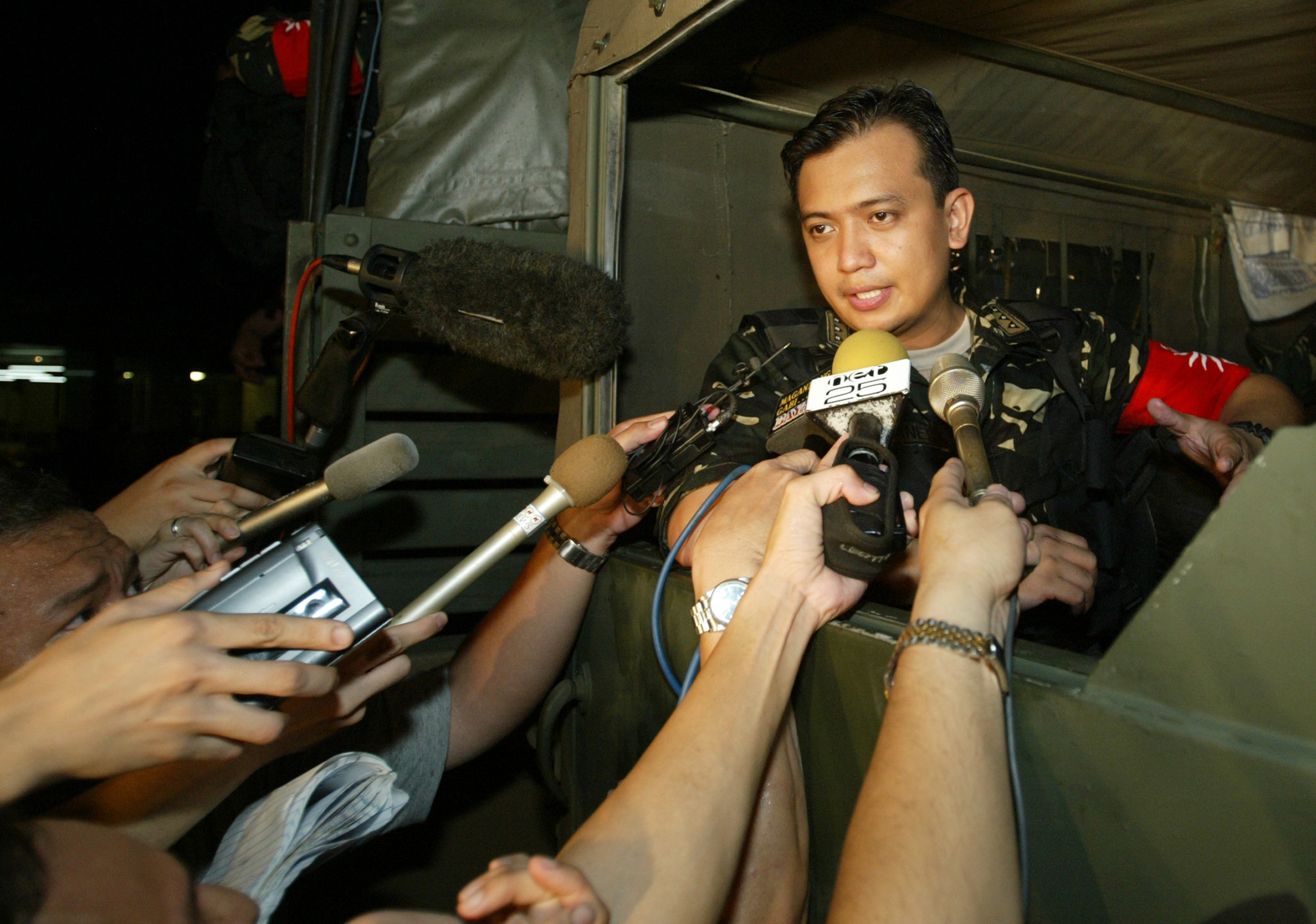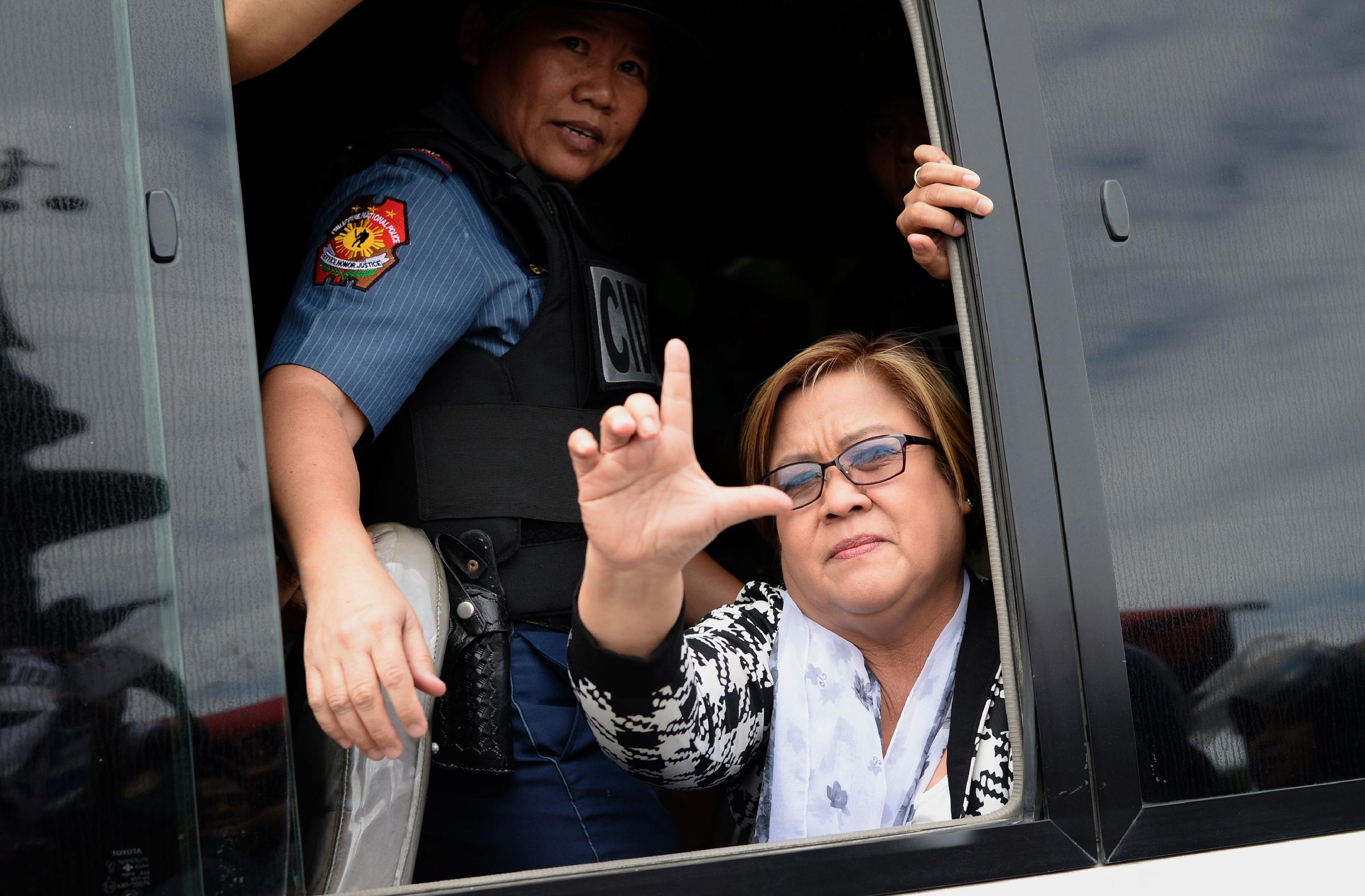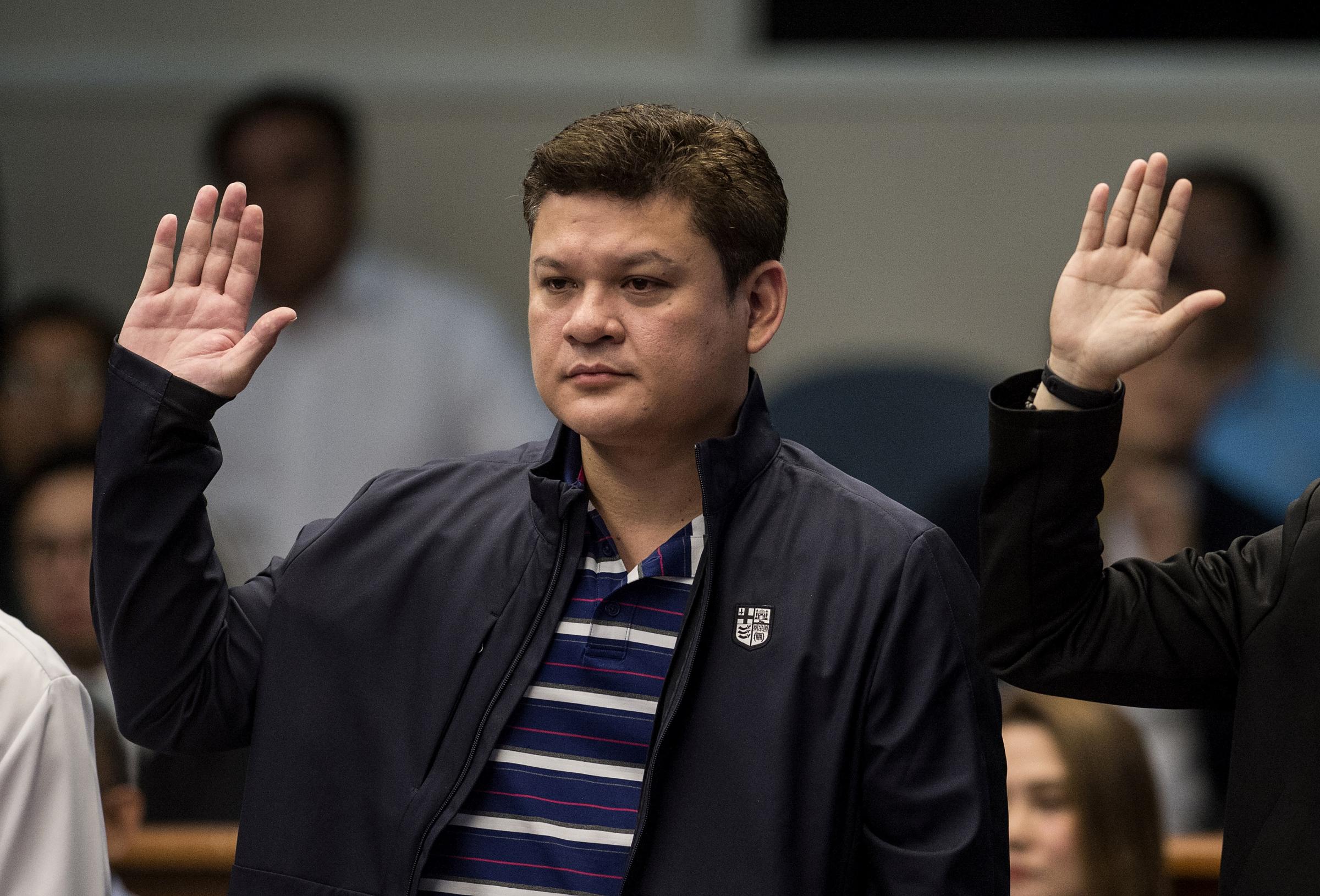
The Philippine Senate can lack a sense of political theater. Beyond the cockerel chained up outside, the lackadaisical weapons pat-down at the gate, and the “deposit your firearm here” plaque at the sign-in counter, the place has a bland institutional feel. Fluorescent lights glimmer weakly on its wooden floors, a bellhop pushes its service elevator’s buttons, and bureaucrats sip coffee in its cafeteria.
Since Rodrigo Duterte became President in June 2016, however, this squat brutalist building in the heart of the Philippine capital has become an arena of unceasing spectacle. In its session hall, masked relatives of murdered slum residents have testified against police, a self-confessed hitman claimed to have fed people to crocodiles at the president’s behest, a former cop corroborated that hitman’s story after a “spiritual awakening,” and the Philippine environmental secretary sang R. Kelly’s 1996 hit, I Believe I Can Fly. Local journalists describe the scenes here as the local telenovela, a Spanish loanword meaning soap opera. Says a Senate reporter: “Welcome to the circus.”
The latest performance came during a probe to determine how a 6.4-billion peso ($125 million) shipment of methamphetamine slipped through the Philippine Bureau of Customs. During a hearing on the issue last month, a retired naval officer turned senator called Antonio Trillanes IV alleged that Paulo Duterte, 42, the Vice Mayor of Davao City — and the President’s son — was complicit in bringing this and other drug shipments before it into the Philippines.
A dragon-like tattoo on the younger Duterte’s back, Trillanes told a packed Senate, proved his membership of a drug-smuggling Chinese triad. Sacred digits traced into the tattoo could be decoded by the U.S. Drug Enforcement Administration, he said, if only Paulo would show it. Paulo refused.
Trillanes has also long alleged that Duterte Sr. amassed billions of pesos in ill-gotten funds, challenging him to open his bank accounts to scrutiny.
“Duterte’s war on drugs is a sham. It’s a misdirection. This is what he does to deflect suspicion,” Trillanes tells TIME from his office in the Senate. “Duterte himself was part of the illegal drug trade in Davao City when he was mayor. They were using Davao City Port as a trans-shipment point for illegal drugs.”
Like his son, Duterte maintains that his wealth is the product of inheritance and legitimate investments, and Paulo has denied involvement in the $125-million shipment.
For a senator to accuse a president of profiting from narcotics would be shocking in most countries. But it has a black irony in the Philippines, where Duterte has said he would be “happy to slaughter” three million drug users and promised that he would not hesitate to order the killing of his own children if they were involved in drugs. Since his drug war began last July police have shot dead at least 4,000 drug suspects in nightly raids. Thousands more have been killed by vigilantes, whom some investigations have linked to police.
Read more: A Bloody Drug War and an ISIS-Linked City Siege Mark Duterte’s First Year in Office
Trillanes’ allegations are compelling enough that the Philippine Ombudsman is now investigating Duterte and his family’s finances. The President, in turn, says he will file impeachment cases against both the Ombudsman and the head of the country’s Supreme Court.
At 46, Trillanes is now Duterte’s principal adversary, since Senator Leila De Lima was jailed in February. De Lima and Duterte’s enmity stretches back to 2009 when De Lima, as head of the government’s commission on human rights, launched a probe into the then Davao City mayor’s alleged use of death squads. After she began investigating extrajudicial killings anew last August, Duterte promised De Lima would “rot in jail” for her alleged involvement in the illegal drug trade, a charge that she has denied. About a dozen convicted felons — some with pending applications for pardon or clemency — said they had funneled drug money to the Senator and police arrested her soon after.
At a recent news conference, Duterte, 72, pulled back his jacket to show reporters a firearm he carries tucked in his waistband for his new first foe. “I’m bringing a gun, not for my enemy because that has already been taken care of by my security, but in case we face each other [in a duel]” he said in Filipino, referring to Trillanes. On another occasion, the President declared: “I destroy him or he will destroy me.”

On a recent Wednesday in a Senate committee room, Trillanes, in a snug navy suit and navy tie, clicked through a series of slides that showed fake news posts that had been disseminated through the Philippines. In one instance, the country’s Justice Secretary had falsely claimed opposition senators such as Trillanes had helped orchestrate the ISIS-inspired siege of Marawi City in the south to destabilize the government. The senator made his recommendations on stymieing the spread of fake news, marched from the committee room, took the elevator up to the fifth floor, and with a flurry of assistants in tow swept past the office of Senator De Lima. Although the number 223 was tacked to De Lima’s door, indicating the number of days she had been in jail, her office was not empty. Inside her aides were hustling to ready her daily briefing pouch of news, messages of support, memes, and senatorial comings-and-goings. To date, De Lima has hand-written 175 dispatches and filed 37 bills from her cell in the police headquarters.
Read more: The Fighter: How Leila de Lima Ended Up Leading the Opposition to Rodrigo Duterte’s Drug War
In his sparsely furnished office a few doors down, Trillanes tells TIME that Duterte and his allies had been determined to silence both him and De Lima — “De Lima legally, by incarcerating her, and myself through political assassination,” he says.
About a week later, he would travel to the U.S. to meet Senator Marco Rubio, who — along with two other U.S. Senators — has expressed grave concern over “extrajudicial killings and human rights violations” in the Philippines. At the time of writing, the Philippine Department of Justice was considering filing treason charges against Trillanes, according to a presidential spokesman.
Military through and through, Trillanes graduated cum laude from the Philippine Military Academy and then, like his father before him, joined the Navy. The patrician IV that follows his family name, it turns out, has nothing to do with lineage and everything to do with differentiating him from his siblings. There’s Antonio Jr., Juan Antonio, Antonio III; also an Antonia and a Dominic. He grew up middle class, he says, and friends call him Sonny.
According to Trillanes’ Senate profile, his naval unit apprehended dozens of human smugglers and rescued 32 passengers from a ferry that sunk during a super typhoon. But he says that corruption and mismanagement by the armed forces’ top brass jarred with such idealized portrayals of duty. After he got hold of a classified document that appeared to indicate the state was killing its own people, Trillanes confronted then President Gloria Arroyo. He received only a dressing down for insubordination.
At breaking point, he and more than 300 other disillusioned junior officers and troopers barricaded themselves inside Manila’s luxury Oakwood Hotel in 2003. They wore armbands bearing nationalistic symbols and demanded Arroyo’s resignation. “Fatherly” talks from senior officers ended the attempted coup d’etat before a shot was fired and “an overheated news conference was the mutineers’ main action,” the New York Times reported at the time. Still, Trillanes was jailed for more than seven years.
Six hundred miles south, then Davao City Mayor Rodrigo Duterte was deep into his anti-criminality campaign. That June, men on motorcycles shot dead a radio host named Jun Pala who often introduced himself on air as “the voice of democracy in Duterte’s reign of terror.” Although Duterte denied involvement in the killing, he said that he knew who was behind it. Pala was killed, the President said, because “he was a rotten son of a bitch,” adding that being a journalist does not exempt you from assassination.
A decade after Oakwood, the Army called the mutiny “wrong” but also said it was “a necessary event” and an “an eye-opener” that led to several reforms, such as better accountability for military spending and a grievance system that allows soldiers to complain about their superiors. The mutiny also thrust Trillanes into the spotlight. In prison, he became the spokesman and de facto leader of the mutineers, who coalesced into a nationalistic party called the Magdalos. To this day, Trillanes has a security staffed by former soldiers he says would take a bullet for him.

There is little of the showman about Trillanes off the Senate floor. In person he is restrained and somewhat austere. His office is empty of trinkets or decoration and beyond a few clues — his rigid posture, his wedding band — it’s difficult to get a handle on the man outside politics.
Retired University of the Philippines professor Mila Reforma taught Trillanes during his masters in Public Administration the year before the Oakwood mutiny. She remembers him as an excellent but solemn student who preferred to work solo and had a keen sense of integrity. His term papers were all on corruption in the Navy, a subject his peers wanted to avoid.
“When he told me that he was going to run for senator, I was very much against it,” she tells TIME. For one thing, she did not think he had the money; for another, there was a rigidity about him that did not seem suited to politics: “He was serious. Too serious for comfort.” The late Senator Miriam Defensor-Santiago once remarked that though young and handsome, Trillanes would “look even better if he attempted to smile once in a while.”
Not everyone is charmed by Trillanes. In September, Senate chair Richard Gordon — whom Trillanes accused of “lawyering” for Paulo Duterte — filed an ethics complaint against the mutineer who he said engaged in “unparliamentary acts and uttered unparliamentary language and exhibited disorderly behavior.” Gordon, 72, tells TIME that such conduct shows the “recidivism” of a man “totally dedicated to havoc.” Besides the coup attempts, he notes that Trillanes shut off the microphone of a pro-Duterte Senator during an investigation into the Davao Death Squad last year and in 2011 humiliated a former Defense Secretary who was accused of embezzling more than $1 million in state funds. Days after Trillanes told Angelo Reyes that he “had no reputation to protect,” the general shot himself through the heart in front of his mother’s grave.
“He gets away with it because he bullies his way out,” says Gordon. “I’m not going to let this pipsqueak senator who doesn’t follow his own code of conduct in the Academy, his own code of conduct as an officer, or the code of conduct in the Senate, get away with it.” (Trillanes faces suspension or expulsion by his colleagues if found guilty of unparliamentary conduct.)

Is the mutineer a true patriot and soldier as his Magdalos insist, an attack dog with no regard for propriety as Gordon claims, or a pragmatist with an axe to grind against Duterte? Though at loggerheads the two share some traits: they are both outsiders with a penchant for drama and prepared to take on the establishment.
Trillanes even asked Duterte to back his Vice Presidential bid in 2016. When asked why recently, the senator claimed that at the time he did not know the president-to-be was a murderer. In the end, Duterte picked another running mate; both he and Trillanes lost to Liberal Party candidate Leni Robredo.
Many Filipinos have expected Robredo to lead the fight against Duterte. (In the Philippine political system, presidents and vice-presidents are elected separately and can be from opposing parties.) Besides a few notable exceptions, however, the popular but politically inexperienced Robredo has demurred from clashes with Duterte. That, and the jailing of De Lima cleared the space into which the combative Trillanes has stepped.
Is it possible to determine whether someone is a member of a triad group on the basis of a code number traced into a tattoo as Trillanes claims? A spokeswoman at the U.S. Department of Justice tells TIME that some agents may have specialized experiences that would enable them to identify organized crime affiliation from a tattoo or other markings, but the Drug Enforcement Administration does not maintain a database of such markings.
Paulo Duterte, who did not respond to TIME’s requests for comment, accuses Trillanes of making a desperate bid to drag down his father. Many in the Philippines’ rapacious social media community joined him in poking fun at Trillanes’ insistence he show his tattoo. “Is he gay?” Paulo Duterte’s lawyer quipped.
As for the President, his main response to Trillanes’ corruption charge was to level the same allegation at the senator. Duterte was later forced to admit he had “invented” the number of a bank account Trillanes supposedly held in Singapore. Soon after the President read out the spurious number in an interview Trillanes flew to the country to prove it did not exist.
For Richard Heydarian, an author and political analyst at Manila’s De La Salle University, Paulo Duterte’s evasiveness and apparent contempt for the Senator did not play well. “This is the court of public opinion and Trillanes has scored points. He is threatening the shield of moral rectitude the President has put forward.”
That threat comes amid a marked decline in Duterte’s once lofty high approval rating. Philippine research group Social Weather Stations’ most recent quarterly survey, published Oct. 8, logged an 18-point fall in Filipinos’ net satisfaction with their President, from 66 to 48. Separate surveys found that three of five Filipinos now believe only the poor are killed in the anti-illegal drug campaign, only around one in five believe police claims that those killed violently resisted arrest, and two-thirds worry that they or someone they know will be a victim of extrajudicial killings.
However, another recently released poll by Pulse Asia found that nine out of 10 Filipinos support the drug war even though three quarters believe extrajudicial killings are taking place.
In a concession to “bleeding hearts and media,” Duterte suspended the Philippine National Police’s involvement in anti-drug operations on Oct 12. He had done the same in January — when local news site Rappler pegged the death toll around 7,000 — as outcry peaked over the police ransom and murder of a South Korean businessman.
This time around, the outrage followed a spate of egregious killings of teenagers in and around Caloocan City, the northern Manila subdivision where Trillanes was born. On Aug. 16 Caloocan police dragged 17-year-old Kian Delos Santos into an alleyway, shot him in the head, and dumped his body next to a pigsty. Days later police murdered Carl Angelo Arnaiz, 19 — he was killed “execution style” with indications he had been tortured, forensics said. Arnaiz’ friend Reynaldo De Guzman, 14, was found about two weeks later floating in a creek with dozens of stab wounds and his head wrapped in packaging tape. According to investigators, De Guzman would have been a vital witness to what happened to Arnaiz.
“It’s not even a covert operation,” says Trillanes. “It’s a public policy to kill Filipinos.”
Read more: In Manila, death comes by night
Whether Trillanes is motivated by disgust at the state killing its own citizens — like he says he was for Oakwood — or by ego and ambition as his critics claim, the mutineer still prowls the Senate, baiting Duterte like a ringmaster. In a rare public statement last month the President’s common-law wife Honeylet Avanceña articulated the predicament neatly: that the senator is still alive, she said, proves her husband is not a murderer.
As long as he is alive, though, Trillanes is at pains to prove the contrary.
More Must-Reads From TIME
- The 100 Most Influential People of 2024
- The Revolution of Yulia Navalnaya
- 6 Compliments That Land Every Time
- What's the Deal With the Bitcoin Halving?
- If You're Dating Right Now , You're Brave: Column
- The AI That Could Heal a Divided Internet
- Fallout Is a Brilliant Model for the Future of Video Game Adaptations
- Want Weekly Recs on What to Watch, Read, and More? Sign Up for Worth Your Time
Write to Joseph Hincks / Manila at joseph.hincks@time.com